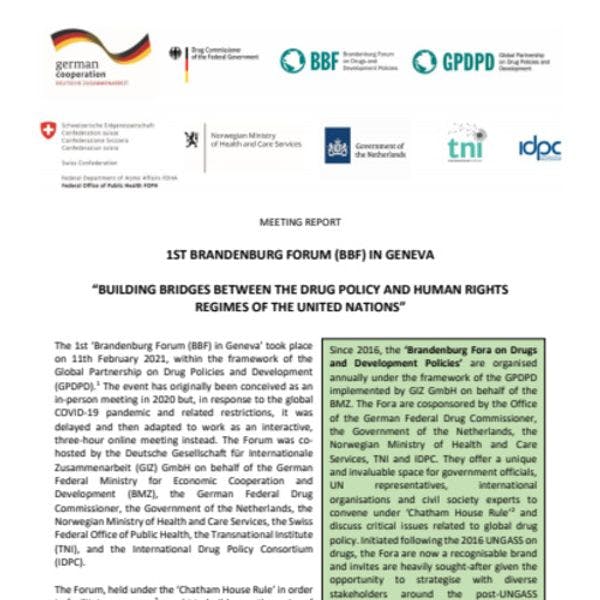BBF
1er Foro de Brandeburgo (BBF) en Ginebra “Tendiendo puentes entre políticas de drogas y regímenes de derechos humanos de las Naciones Unidas"
El Foro brindó un espacio de confianza para discusión y debate importantes con el fin de reforzar el foco de políticas sobre drogas al interior de los órganos clave de salud y derechos humanos en Ginebra. Más información, en inglés, está disponible abajo.
The 1st ‘Brandenburg Forum (BBF) in Geneva’ took place on 11th February 2021, within the framework of the Global Partnership on Drug Policies and Development (GPDPD). The event has originally been conceived as an in-person meeting in 2020 but, in response to the global COVID-19 pandemic and related restrictions, it was delayed and then adapted to work as an interactive, three-hour online meeting instead. The Forum was cohosted by the Deutsche Gesellschaft für Internationale Zusammenarbeit (GIZ) GmbH on behalf of the German Federal Ministry for Economic Cooperation and Development (BMZ), the German Federal Drug Commissioner, the Government of the Netherlands, the Norwegian Ministry of Health and Care Services, the Swiss Federal Office of Public Health, the Transnational Institute (TNI), and the International Drug Policy Consortium (IDPC).
The Forum, held under the ‘Chatham House Rule’ in order to facilitate openness, sought to build upon the series of high-profile Brandenburg Forums on Drugs and Development Policies held in Germany since 2016 – providing a trusted space for important discussion and debate to strengthen the drug policy focus within the key health and human rights bodies in Geneva. The online nature of the Forum allowed the co-hosts to bring together a diverse group of 72 participants (38 women and 34 men) from around the world. This included representatives from the United Nations (UN) Office of the High Commissioner for Human Rights (OHCHR), the World Health Organisation (WHO), the International Narcotics Control Board (INCB), the UN Human Rights Committee, the UN Working Group on Arbitrary Detention, the UN Development Programme (UNDP), the UN Office on Drugs and Crime (UNODC), and the Joint UN Programme on HIV/AIDS (UNAIDS). Furthermore, there were representatives from other intergovernmental bodies, a number of experts from relevant civil society and community-led organisations, and 38 government officials from 14 countries (Albania, Argentina, Finland, France, Germany, Jamaica, Mexico, the Netherlands, Norway, Portugal, Sweden, Switzerland, Thailand and Uruguay).
The event began with warm welcomes from Swiss Ambassador H.E. Felix Baumann the Federal Drug Commissioner of Germany Daniela Ludwig MP, and senior officials from the Governments of Norway and the Netherlands. Ambassador Baumann reiterated Switzerland’s belief that the multifaceted world drug situation “cannot be discussed without its health and human rights aspects”, and highlighted the importance of cooperation between UN entities – especially in light of the UN system common position on drug-related matters4 and the 2030 Agenda for Sustainable Development.5 The Federal Drug Commissioner of Germany further highlighted the International Guidelines on Human Rights and Drug Policy6 (whose development was supported by GPDPD and the Swiss Government as well as UNDP) and its reference in the European Union Drug Strategy 2021-20257 (adopted under the German Presidency of the EU Council) as sending out a “strong signal to those violating fundamental human rights” in the name of drug control. Several participants underlined how the COVID-19 pandemic has put a magnifying glass on different societal problems we face.
Descargas
Temas
Regiones
Perfiles relacionados
- Transnational Institute (TNI)
- International Drug Policy Consortium (IDPC)
- Global Partnership on Drug Policies and Development (GPDPD)
